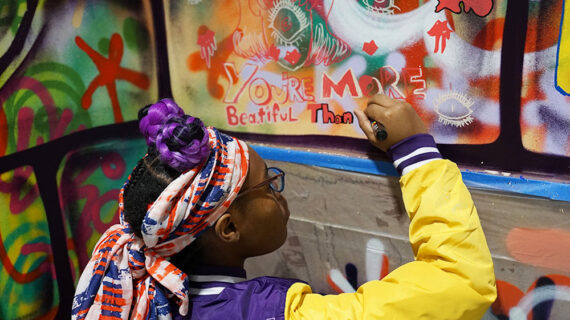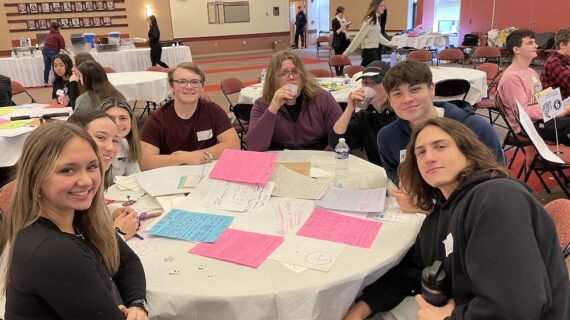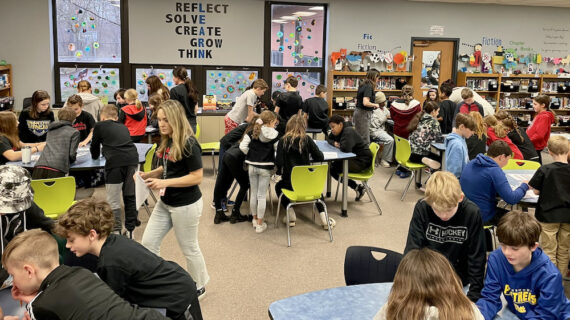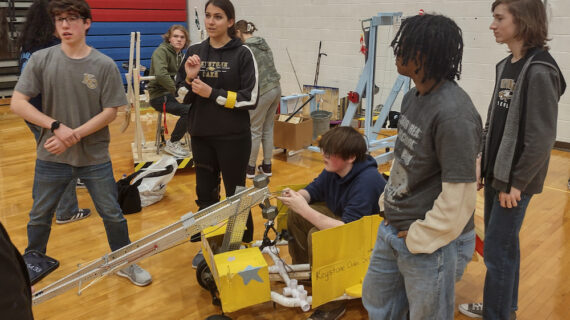
In the Carlynton School District, a support system for girls blossoms into something even bigger
This story is one in a series created in collaboration with the AASA Learning 2025 Alliance to celebrate the work of groundbreaking school districts in the Pittsburgh region. Kidsburgh will share these stories throughout 2024. (Photo above by Anderson Rian via Unsplash.)
High school can be brutal. Cliques, peer pressure — and for some, the added stress of poverty and racism. For girls, our culture’s limiting gender roles can make things even harder.
At Carlynton Junior-Senior High School, an innovative program called Girls Supporting Girls is changing that landscape. As the program grows, girls are building skills, forging friendships, and even charting paths toward future careers.
The program started last year when Patricia Serdy, the school psychologist, began looking at the data around hospitalizations and mental-health referrals.
“I was finding some pretty consistent trends — girls that were at an age in their life where they were really just struggling, but they were struggling alone,” Serdy says. “As I started working with the girls, I found that when one student comes in with an issue and I’ve been addressing that issue with another student, I’ll get both students’ permission to kind of bring them together. And we would start problem-solving together.”
Girls are confidentially paired with a peer who has struggled with similar problems and gotten through it. These conversations, Serdy says, give girls hope.
Serdy also noticed that girls can be “so quick to tear each other apart rather than build each other up,” she says. “I thought if we could bring girls together to support each other, maybe we could reduce some of that.”
PREVENTING BAD PATHS, ENCOURAGING GOOD ONES
As subjects surface — a death in the family, the stress of being bullied, medical conditions — girls at Carlynton meet peers who understand. Through confidential connections, they share experiences and stories of hope about things like emerging from unhealthy dating relationships.
Over time, a deeper community is forming.
“I’ve noticed that if some of the girls are getting bullied, the older girls not only give them advice, but they look out for them, like in the cafeteria and other places,” Serdy says. “They step up and show up for them.”
This innovative program is just one way social-emotional learning is growing at Carlynton.
The district is part of the Western Pennsylvania Learning 2025 Alliance, a regional cohort of school districts working together — with support from The Grable Foundation — to create student-centered, equity-focused, future-driven schools. Led by local superintendents and AASA, The School Superintendents Association, the Alliance convenes to help districts like Carlynton do what they do best: help kids build the brightest possible future.
In that spirit, and with an assist from elementary teacher Don Alexander, Serdy now is helping Carlynton’s seniors find inspiration beyond high school.

Older high-schoolers spoke of worries about life after graduation. What would come next? In particular, girls growing up in a cycle of poverty felt hopeless. So Serdy and Alexander began bringing the girls to visit women who had overcome struggles and now owned their own businesses.
“These women had very untraditional routes and shared their stories about how they got to where they are,” Serdy says. “And that was a really big inspiration for all these girls and opened their minds to so many different careers that they didn’t think were possible for them.”
A group of girls traveled to Braddock, for example, where they visited the Hollander Project, a coworking space founded by entrepreneur and nonprofit executive Giselle Fetterman. There, the students met women of color who are launching their own businesses.
Fetterman, an immigrant from Brazil who co-founded 412 Food Rescue and is the spouse of U.S. Senator John Fetterman, met with the students — including one who is a refugee from Syria — and told the story of her own challenges.
“The student could see the similarities in some of the difficulties that they both had and how she can move forward herself,” Serdy says. “Now she’s totally inspired.”
The girls also visited a hair salon and met the women who worked there, and the woman who opened the business. Some of the girls are taking cosmetology and began realizing that beyond working in a salon, one day they could open their own.
“It’s easy to see why I wanted to get involved,” Alexander says. “I was really just blown away by what some of the girls were going through, and also feeling kind of helpless myself — like, what part can I play in all this?”
Alexander proposed a Women’s Empowerment Summit where Carlynton’s girls could meet with Fetterman and other inspiring women from the community who, as Alexander puts it, “they may see on the street or on TV.” This year will mark the second year of the summit.

Lives are changing at Carlynton, as girls help other girls navigate one of life’s most difficult transitions. The progress is captured in a moment from last year’s summit, remembered vividly by Serdy, when two younger girls were involved in an episode of bullying.
“A high-school student witnessed it and she got very mad at first, but in the end she wanted to talk with the younger girl who was doing the bullying. She said to the girl, ‘When I was younger, I thought it was cool to be mean to other people. I can tell you, it’s not cool. It’s not okay. And there are other ways to handle it.’
“That conversation is way different than if I had it with that student,” Serdy says. “She was able to take the perspective of ‘I don’t agree with what you’re doing, but I’ve done it too. I’ve made that mistake. Please just be a nicer student.’ And I think that makes a very big difference.”
Want to download this story? Click here for a PDF.














